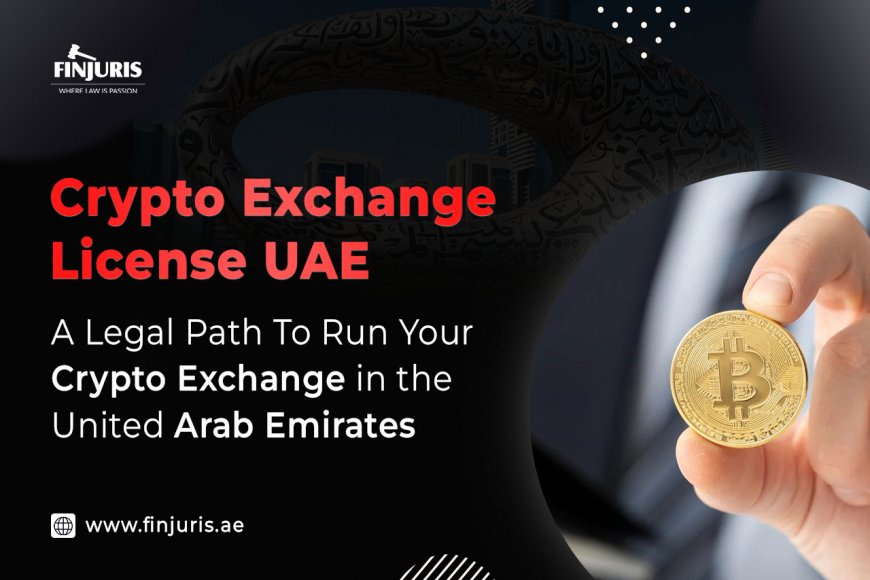Crypto Exchange License UAE: A Legal Path To Run Your Crypto Exchange in the United Arab Emirates
A cryptocurrency exchange license in the UAE is a permission issued by the relevant regulatory authorities that enables a firm to lawfully operate a cryptocurrency exchange platform within the nation.

The crypto exchange license UAE is one of the most sought-after licenses in the world for running a cryptocurrency exchange in the region. This is because of the UAE’s global standing regarding virtual assets. UAE has become the epitome of innovation and technology, leaving all major nations behind in their openness to accept digital currencies. Giant players in the industry such as Binance, E Toro, Kraken have all flocked to UAE to explore and exploit the business opportunities available in the region.
What is a Crypto Exchange License UAE?
A cryptocurrency exchange license in the UAE is a permission issued by the relevant regulatory authorities that enables a firm to lawfully operate a cryptocurrency exchange platform within the nation. This license allows the holder to facilitate the purchase, sale, and trading of cryptocurrencies such as Bitcoin, Ethereum, and others, as well as the provision of associated services such as wallet management and fiat-to-crypto or crypto-to-fiat transfers.
The particular requirements and processes for getting a cryptocurrency exchange license in the UAE may differ based on the emirate in which the exchange seeks to operate and the regulatory framework in effect at the time of application. In general, acquiring such a license entails showing compliance with legislation governing anti-money laundering (AML), know-your-customer (KYC) processes, cybersecurity, financial transparency, and other applicable laws.
Overall, a Crypto Exchange License UAE is an official acknowledgment from regulatory authorities that a cryptocurrency exchange platform has met the required regulatory standards and is legally permitted to operate within the country, instilling trust in users and investors while ensuring the security and reliability of the crypto market ecosystem.
To operate a cryptocurrency exchange in the United Arab Emirates (UAE), you must follow the regulatory framework established by the appropriate authorities. Here's a rough description of the legal process to operate a cryptocurrency exchange in the UAE:
Understand the Regulatory Environment: Familiarize yourself with the regulations that regulate cryptocurrencies and exchanges in the UAE.
Company Setup: The first step is to create a legal entity in the UAE, which can take the shape of a business or a branch office. This includes selecting the right business structure and registering with the proper authorities, such as the Department of Economic Development (DED) or the local free zone authority.
Compliance Requirements: Cryptocurrency exchanges in the UAE must adhere to strict compliance standards, such as anti-money laundering (AML) and know-your-customer (KYC). Businesses must have strong AML/KYC procedures to verify clients' identities and avoid illegal actions such as money laundering and terrorism funding.
Licensing: Depending on the nature of the crypto exchange activity, organizations must get particular licenses from regulatory bodies such as the Virtual Assets Regulatory Authority (VARA). The licensing procedure usually entails filing an Initial Disclosure Questionnaire (IDQ), satisfying qualifying requirements, and going through regulatory examination.
Cybersecurity Protection: Cryptocurrency exchanges are prominent targets for hackers, thus strong cybersecurity measures are required. This involves safeguarding the exchange's infrastructure, adopting encryption mechanisms, and performing regular security audits to safeguard consumer dollars and sensitive information.
Legal Compliance: Cryptocurrency exchanges must adhere to all applicable laws and regulations in the UAE, including tax laws, consumer protection legislation, and any particular policies governing financial services and electronic payments.
Ongoing Compliance Monitoring: Once operating, cryptocurrency exchanges must continue to comply with regulatory regulations and norms. This involves monitoring regulatory developments, revising compliance policies and processes as needed, and collaborating with regulatory agencies as appropriate.
Overall, running a cryptocurrency exchange in the UAE necessitates a thorough understanding of the regulatory landscape as well as rigorous compliance with legal and regulatory regulations. Seeking legal assistance and interacting with regulatory officials may help guarantee that operations run smoothly and compliantly within the UAE's regulatory framework.
To summarize, acquiring a cryptocurrency exchange license in the United Arab Emirates (UAE) is a thorough procedure that requires adherence to a complete regulatory framework created by the relevant authorities. This framework intends to protect the integrity, security, and transparency of cryptocurrency exchange activities in the UAE while minimizing risks such as money laundering, terrorist funding, and cybersecurity threats.
Businesses looking to set up cryptocurrency exchanges in the UAE may prove their commitment to regulatory compliance by following the legal process outlined above, boosting investor confidence and contributing to developing the region's robust and trusted cryptocurrency ecosystem.
Overall, having a cryptocurrency exchange license in the UAE is not just a legal need, but also a strategic essential for firms that desire to capitalize on the rising demand for digital currency services while operating in a secure and controlled setting. Cryptocurrency exchanges may successfully traverse the shifting regulatory landscape by monitoring compliance and engaging with regulatory authorities continuously, contributing to the growth and maturity of the UAE cryptocurrency sector.
What's Your Reaction?




















